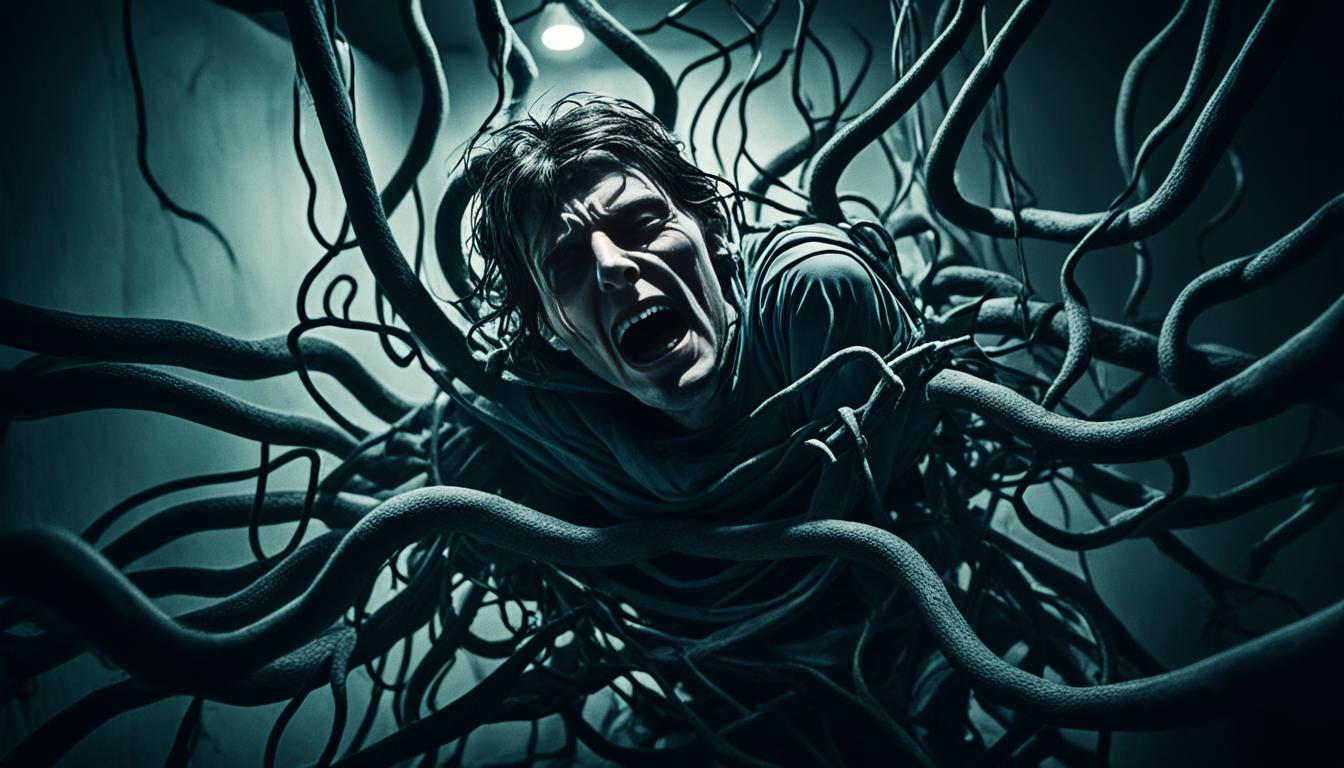Sleep terrors, also called night terrors, trigger intense fear and a fast heart rate. They happen suddenly during sleep, with loud screams sometimes. People with sleep terrors may have wide, scared eyes, sweat a lot, and breathe fast. They might also kick or thrash around. These episodes usually happen during deep sleep, not when dreaming.
Kids between 4 and 12 often have sleep terrors, but they can also affect adults. This issue is called parasomnia and can be scary. Most kids grow out of it, but adults might still experience it.
Sleep terrors may result from not getting enough sleep, being too tired, or feeling stressed. Also, if your sleep routine is off or if you have health conditions, you might have them. It’s important to find out and deal with what’s causing them to sleep better.
Key Takeaways:
- Sleep terrors, also known as night terrors, are episodes of intense fear during sleep.
- They are characterized by sudden arousal, often accompanied by a loud scream or cry.
- During sleep terrors, individuals may display signs of fear, such as wide-staring eyes, sweating, rapid breathing, and an increased heart rate.
- Sleep terrors typically occur during non-REM sleep, specifically during the slow-wave stage.
- They are more common in children, but can also occur in adults.
- Underlying causes of sleep terrors include sleep deprivation, extreme tiredness, stress, disruptions in sleep schedules, and underlying medical conditions.
Symptoms of Sleep Terrors
Sleep terrors, or night terrors, bring about unique signs. When these happen, a person might suddenly wake up crying out or screaming. They seem extremely scared, with their eyes wide open and appearing frightened.
Also, their body may react in different ways like sweating, breathing fast, quick pulse, red face, and wide pupils. Usually, they move a lot, kicking and tossing around.
They are hard to wake up from, and even then, they’re usually very confused and difficult to calm down. Sleep terrors happen in the first half of the night and not during REM sleep like nightmares. What’s strange is that the people who have them often don’t remember anything about the experience once they’re awake. This can really mess with the quality of everyone’s sleep involved, not just theirs.
Common Symptoms of Sleep Terrors:
- Loud screams or cries for help
- Appearance of intense fear
- Wide-staring eyes
- Sweating
- Rapid breathing
- Racing pulse
- Flushing of the skin
- Dilated pupils
- Agitated motor activity (kicking, thrashing)
- Difficulty awakening during an episode
- Confusion upon waking up
- Not typically remembered upon waking
Sleep terrors are really tough on those who go through them and their families. It’s crucial to get the right help and find ways to make these episodes less frequent. Improving how well everyone sleeps is the big goal here.
Causes and Risk Factors of Sleep Terrors
The reason why sleep terrors happen isn’t fully clear. Yet, several things may play a role in their start.
- Sleep paralysis: It’s a sleep issue that can kick off sleep terrors. When you wake up from REM sleep, your muscles can be frozen. This makes it hard to move.
- Nightmare disorder: This is another type of sleep problem that links to sleep terrors. It leads to having lots of bad dreams that feel real. These dreams can be very vivid.
- Trauma and PTSD: Going through hard times or having PTSD can make sleep terrors more likely.
- Fear of potential events: Being scared of bad things happening while you sleep can spark sleep terrors. This includes fears like theft or fire.
- Genetic predisposition: Some families might be more prone to sleep terrors, hinting at a possible genetic link.
- Sleep deprivation and extreme tiredness: Not getting enough sleep or pushing yourself too hard can up your chances of having sleep terrors.
- Stress and sleep schedule disruptions: Big amounts of stress and messy sleep patterns can also make sleep terrors more common.
- Underlying medical conditions: Certain health issues, such as sleep apnea or epilepsy, are tied to a higher risk of sleep terrors.
Learning about these triggers can help you and your doctor plan how to deal with sleep terrors. This knowledge is key to getting better sleep and fewer episodes.
Stem Cell Therapy for Sleep Terrors
Research on stem cell therapy for sleep terrors is still early. This new treatment method is showing potential to help those with this sleep problem. Stem cell therapy uses the regenerative power of stem cells. They can fix or even replace cells that are not working right.
It’s not clear yet how well stem cell therapy works for sleep terrors. But, we do know that this treatment helps with many other health issues. There needs to be more studies to see if it can really help people with sleep terrors.
The main way to treat sleep terrors now is to solve what’s causing them. This includes fixing things like not getting enough sleep, being stressed, or having a bad sleep routine. Certain therapies, like facing fears directly or changing how you think about them, can really help. Sometimes, doctors might also give you medicine to calm anxiety or fear. It’s smart to talk with a doctor who knows about sleep problems. They can help make a plan that’s right for you.

